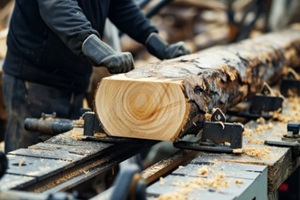
Logging companies face higher rates of worker injury than most other industries. However, among forestry workers, sawmill employees are at particular risk. In addition to the heavy reliance on machinery and the potentially tight timelines for production, it quickly becomes clear how important sawmill insurance is for a business in this sector.
Many forestry companies assume that their equipment and employees are covered under a general policy, such as equipment insurance. While this might be true to some extent, sawmill insurance exists for a reason: to more specifically protect these operations and reduce the number of exclusions that could result in hefty out-of-pocket costs.
Here is an overview of sawmill insurance and how to tell if your business needs it.
What Is Sawmill Insurance?
Sawmill insurance is a more specific policy in the overarching scope of forestry coverage. Sawmills are hazardous places, and the dangers within span a greater variety than what may be included in basic insurance policies. Some of the primary risks sawmill companies encounter include:
- Machinery malfunction
- Business interruption
- Fire damage (sawdust is particularly susceptible to ignition)
- Damage to electrical components
- Worker injury
Sawmill insurance can target these coverage needs more accurately to make sure a sawmill can operate confidently.
Who Needs Sawmill Insurance?
Despite the name, sawmill insurance is not limited to facilities with active saw equipment. Many timber-related companies can benefit from sawmill insurance coverage, including mills and treatment plants. Whether or not sawmill insurance is right for you depends on your business’s tasks and equipment.
What Sawmill Insurance Includes
The right sawmill insurance should be customized to suit the specific business it is covering. However, many types of coverage remain the same across sawmill policies, including:
- Equipment – This policy insures the saws and machinery, providing repair or replacement cost coverage to help keep production on track.
- Business Interruption – If an accident or natural event prevents the sawmill from adhering to the intended project schedule, business interruption insurance can bridge the gap. This type of coverage can pay for building rental, utility bills, and other necessary costs until the business is operational.
- Liability – Sawmills can face significant liability issues, such as harm to third parties visiting the facility. Sawmill insurance should include liability protection to help cover expenses and legal fees related to these accidents.
- Workers’ Compensation – Because working in a sawmill is dangerous, a workers’ compensation insurance policy is non-negotiable (in fact, it is mandatory in many states). This policy provides benefits to employees who are injured or sickened as a result of their job. Workers’ compensation can financially support affected individuals and families, from medical bills to funeral costs.
These are just a few of the many types of coverage that a sawmill insurance policy can provide. Work with an insurance provider specializing in sawmill policies to customize your protection to your business’s needs.
What Might Not Be Part of a Sawmill Policy
While a sawmill might carry equipment protection, workers’ comp, and more, business owners might be surprised to learn that some protections are not included. The most common gaps in coverage with a sawmill insurance policy include:

- Movable equipment – Portable mills, work trucks, and more may need additional protection if not written into the standard equipment insurance.
- Additional services – Many sawmills operate multiple branches of work. They may process timber but may maintain a side business transporting logs or treating the wood in the same facility. These services should secure insurance protection, even if they are technically part of the sawmill. This makes sure all practices are properly supported and that nothing is omitted.
- Compliance issues – Sawmill insurance will not necessarily protect the business from breaches in regulatory adherence. The sawmill must still follow all industry safety, training, and operation standards, or it may be subject to fines not covered by insurance.
Learn More About Sawmill Insurance Policies
Sawmills face significant risks from multiple angles every single day. Even versatile insurance policies may be ineffective if they are not customized to the specific operational routines of your business. The professionals at Burton & Company regularly work with teams in the forestry industry. We will work with you to create customized coverage for your business and budget. Contact Burton & Company today to speak with an industry professional.

